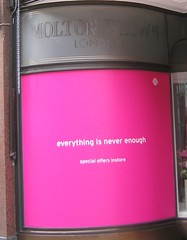
I couldn't have made this up--and I didn't. It is the marketing slogan for Molton Brown, purveyors of perfumed cosmetics to the high and mighty. It is a perfect mission statement for the consumptive economy we live in. To be the change we want to see in the world in economic terms we all need to cultivate a consciousness of sufficiency and think hard about what enough is, perhaps rather than what is enough.
Enough is a vital concept: if we have enough we are not deprived. To learn this we need to begin to share the mindset of subsistence societies, like those reported by Marshall Sahlins in Stone Age Economics, who managed to meet their needs in only a couple of hours a day and spent the rest of their time playing, singing, carrying out rituals, resting, and so on. Ray Mears' current TV series is exploring just this issue, helping us into the sustainability mind-set of our neighbours.
Working more hours and buying more things will never bring us sufficiency, just an endless cycle of more unsatisfied wants, and more work to earn the money to satisfy them. In an article I am very proud to have called 'Sen and the Art of Market-Cycle Maintenance' I have explored the way in which the combination of the concept of ‘relative deprivation’ and the advertising industry create a world where we will always feel the need for more. The maintenance of this feeling of scarcity is necessary to encourage the increasing consumption that economic growth requires. Here is what Marshall Sahlins wisely said about this:
Modern capitalist societies, however richly endowed, dedicate themselves to the proposition of scarcity. Inadequacy of economic means is the first principle of the world’s wealthiest peoples. The market-industrial system institutes scarcity, in a manner completely unparalleled and to a degree nowhere else approximated. Where production and distribution are arranged through the behaviour of prices, and all livelihoods depend on getting and spending, insufficiency of material means becomes the explicit, calculable starting point of all economic activity.
Three assumptions underlie the ethic of scarcity:
- There is shortage and if I do not immediately take my share, there will not be enough for me. This understanding is partly one of the many unacknowledged consequences of the wartime rationing experienced by the older generation who have bequeathed us their fears, but is reinforced constantly by advertising urging us to buy now before stocks expire.
- You must take what you can now and then keep it. Giving to somebody else will mean you are left short of something you need. This leads to hoarding of unnecessary items which might be useful to somebody else.
- You will be left without and there will be dire consequences because nobody will help you. In other words it is an ethic based on fear.
- There is plenty for all our needs: nature is bountiful when we treat her with respect and care.
- Sharing is good for the giver as well as the receiver and moves us towards the kind of world we want to live in.
- You can trust others to look after you: we are better at looking after each other than selfishly competing.
amazing how pure Islamic banking & financing once were ... religious sciences et al ... now, well, Islamic banking & financing has taken on new meaning ... if you care try a google news search for islamic banking ... ... general background ... "elimination of risk has replaced the elimination of scarcity as a major preoccupation." ... http://www.international.ucla.edu/article.asp?parentid=15056
ReplyDeleteTo learn this we need to begin to share the mindset of subsistence societies, like those reported by Marshall Sahlins in Stone Age Economics, who managed to meet their needs in only a couple of hours a day and spent the rest of their time playing, singing, carrying out rituals, resting, and so on.
ReplyDeleteThis is interesting stuff, Molly. From my limited reading, neoclassical economics defines economics as dealing with "the allocation of scarce resources." Yet if we think about the hunter-gatherers who came before us, you're quite right that, at least in many regions of the world, they did not have to scrounge for scarce resources. The amount of work was modest and interesting. (I'm not advocating hunting, but I think being a hunter-gatherer would rank as much more interesting than the average cubicle job.) And they were content with "enough."
So how did we get ourselves into this mess of requiring massive economic systems to allocate scarce resources and huge portions of the population for whom work is endless drudgery, and other huge portions who really don't have "enough"? Seems the economic system hasn't helped much.